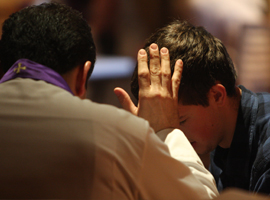
The Sacrament of Reconciliation is one of the most unique and beautiful aspects of Catholicism. Jesus Christ, in His abundant love and mercy, established the Sacrament, so that we as sinners can obtain forgiveness for our sins and be reconciled with God and the Church. The sacrament “washes us clean,” and renews us in Christ.
This sacrament is known by many names:
By his death on the Cross, Jesus Christ redeemed man from sin and from the consequences of his sin, especially from the eternal death that is sin’s due. So it is not surprising that on the very day he rose from the dead, Jesus instituted the sacrament by which men’s sins could be forgiven.
A power granted by Christ
It was on Easter Sunday evening that Jesus appeared to his Apostles, gathered together in the Upper Room, where they had eaten the Last Supper. “He said to them again, ‘Peace be with you! As the Father has sent Me, so I am sending you.’ After saying this, he breathed upon them, and said to them, ‘Receive the Holy Spirit; whose sins you shall forgive, they are forgiven them; and whose sins you shall retain, they are retained.’” John 20:21-23.
This power to forgive sin which Jesus conferred upon his Apostles was not, of course, to die with them; no more so than the power to change bread and wine into his Body and Blood, which he conferred upon his Apostles at the Last Supper.
Jesus did not come upon earth just to save a few chosen souls, or just the people who lived on earth during the lifetime of his Apostles. Jesus came to save everybody who was willing to be saved, down to the end of time. He had you and me in mind, as well as Timothy and Titus, when he died on the Cross. It is evident then that the power to forgive sins is a part of the power of the priesthood, to be passed on in the sacrament of Holy Orders from generation to generation. It is the power which every priest exercises when he raises his hand over the contrite sinner and says, “I absolve thee from thy sins in the name of the Father, and of the Son, and of the Holy Spirit. Amen.” These are called “the words of absolution.”
The sacrament of Reconciliation is a sacrament in which the priest, as the agent of God, forgives sins committed after Baptism, when the sinner is heartily sorry for them, sincerely confesses them, and is willing to make satisfaction for them.
At St Mary Magdalen church, the sacrament of Reconciliation is normally available on Saturdays at 5:30 pm, upon request after weekday Masses or by appointment.